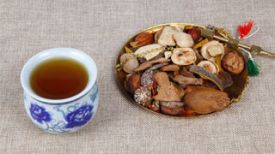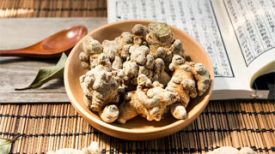
Today, we will introduce a magical Chinese medicinal herb that looks like a "small screw" but has a famous name - "life-saving fairy grass". After being used as medicine, it is used for health preservation and health care. The liver and kidneys compete for love, and it can also resist aging and strengthen the body.
This small screw is Dendrobium officinale.Perhaps some people are not very familiar with Dendrobium officinale, let alone why it is called a "life-saving herb". The origin of this name is profound. In ancient times, due to underdeveloped medicine and relatively difficult living conditions, the average life expectancy was very short, and people in their forties were called "old men".
However, the "Medicine King" Sun Simiao enjoyed a hundred year lifespan, which was related to his long-term use of dendrobium for health preservation. In addition, according to historical records, Sun Simiao once used the miraculous hand of dendrobium to revive and save lives, and the name "life-saving immortal grass" was also passed down.
There are dozens of species of Dendrobium officinale, but in the 2010 edition of the Chinese Pharmacopoeia, Dendrobium officinale is listed separately. The Daozang, written over 1000 years ago, also regards it as the top of the "Nine Immortal Grasses of China".
What is the use of Dendrobium officinale?
1. Remove deficiency heat
The Compendium of Materia Medica records that it goes: "Entering the spleen, removing deficiency heat.". Dendrobium has a sweet and slightly cold taste, which enters the spleen and can benefit the stomach and produce fluids, nourish yin and clear heat. The heat it clears is completely a type of deficiency heat, characterized by yin deficiency and excessive heat.
I think of a historical story about this effect. Legend has it that when Han Yu was demoted to Chaozhou Prefecture, he suffered from deficiency heat due to being unsuitable for the local environment. He felt tired, dizzy, and had insomnia. His urine turned yellow and red, and he was getting worse and worse. After eating the local herbaceous plant Dendrobium officinale, he miraculously recovered.
2 strong liver and kidney
Dendrobium officinale enters the Kidney Meridian, which is affirmed in the Compendium of Materia Medica for its nourishing yin and tonifying kidney effects. The liver and kidney share the same origin, strengthening the source of water, and the wood relies on honor to nourish the liver and body. This means that Dendrobium officinale can not only nourish the liver but also the kidneys.
Not only that, the sweet taste of Dendrobium officinale can fade into the spleen, benefit the stomach and generate fluids, nourish the soil and trees, and strengthen the spleen and liver. Take it for health, the liver, spleen, and kidneys are all vying for love! Meanwhile, modern clinical practice has also found that Dendrobium officinale has the effect of reducing liver damage.
3. Anti aging
Women often wear Dendrobium officinale, which can maintain their appearance and strengthen their body. The famous health preservation master of the Tang Dynasty and the imperial physician of the Six Dynasties, Ye Fashan, provided Cixi with a secret formula for nourishing her appearance. Saffron was the king's medicine, while Dendrobium officinale and Ganoderma lucidum were the official medicines. Cixi ate it for 50 years, always looking radiant and energetic.
The aging of a person is not only reflected in their appearance, but in the concept of traditional Chinese medicine, when they are forty years old, their yin and qi will naturally decline, leading to a decline in their daily life. After the age of forty, people age very quickly, and the deficiency of yin and jin in the body is the crux. Due to the deficiency of Yin Jin and Yin Qi, the external Yang Qi is also insufficient. As a result, people's daily life is not smooth, and aging is complete.
To delay aging, it is necessary to replenish yin and produce fluid, maintain the balance of yin and yang. Dendrobium officinale is particularly good at replenishing yin and producing fluid, and the so-called "light body and prolong life... tonifying kidneys and strengthening muscles and bones" (Compendium of Materia Medica) also confirms its anti-aging effect.
4. Lowering blood sugar
The manifestation of high blood sugar is drinking, eating, and urinating frequently, with a sweet taste in the urine. In traditional Chinese medicine, this type of disease is collectively referred to as "thirst quenching". How to treat diabetes syndrome? The Yellow Emperor's Inner Canon states that the focus is on nourishing yin and generating fluids, balancing yin and yang.
Dendrobium officinale is a good medicine. According to the Records of Traditional Chinese Medicine, it can "produce fluid and quench thirst". According to the Records of Materia Medica, it can "anneal, nourish yin, eliminate boredom... and also quench thirst and sweat". Dendrobium officinale can not only nourish yin, produce fluid and quench thirst, but also clear lung and stomach deficiency heat, which can be used to alleviate the symptoms of diabetes.
In addition, the Shennong Compendium of Materia Medica and the Compendium of Materia Medica also mention its role in tonifying the deficiency, fatigue, and weakness of the five internal organs. All physical weakness caused by fatigue and exhaustion can be treated with Dendrobium officinale, which can resist fatigue, strengthen muscles and bones, and in current terms, enhance immunity.
The content of the article is for clinical reference only. Non professionals in traditional Chinese medicine are not allowed to try medication.


